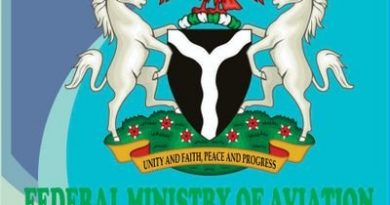
The Nigerian Aviation Handling Company (NAHCO) Plc has come forward to clarify how the ex-workers of NAHCO were paid, when the ex-workers faulted claim by NAHCO that it had paid N1.1 billion to them since the privatisation of the company.
It will be recalled that NAHCO Plc and the Pension Transitional Arrangement Directorate (PTAD) are caught up in a controversy over the N1.1 billion gratuities paid to the ex-workers of the company as severance package during the privatisation of the foremost handling firm.
The gratuities were supposed to be paid by the Bureau for Public Enterprise (BPE) then, from proceeds of the sale of the company in 2005, but the liability was later inherited by PTAD.
The ground handling company said it paid the entire gratuities due to its 936 staff who were either retrenched or re-absorbed back into the system, according to its Condition of Service (CoS) as at the time, after waiting for BPE to offset the huge bill of the ex-workers.
The Head, Human Resources of NAHCO, Mr. Ganiyu Afolabi, who explained this in Lagos, recently, added that after the privatisation of NAHCO in 2005, the new management commenced payment of gratuities to disengaged and reabsorbed staff from 2008.
According to him, the new management rather than wait for BPE to pay its workers who were either disengaged or reabsorbed commenced the payment of severance packages with the hope of getting a refund from Bureau.
The company, however, said between 2008 and 2020, no fewer than 11 correspondences had emanated from it to the BPE and the Pension Transitional Arrangement Directorate (PTAD), a directorate that BPE transferred the case to.
The first of such correspondences according to Afolabi, was on May 15, 2008, while it sent a reminder letter to the bureau on April 2, 2009.
Others were July 27, 2009; January 13, 2010; March 8, 2010; October 27, 2010; September 7, 2011; February 22, 2012; July 19, 2012; February 19, 2019 and July 16, 2019.
He disclosed that a July 19, 2012 letter from NAHCO eventually led to a major response from BPE, which in 2013, in a letter signed by Mr. Benjamin Dikki, its then Director-General of BPE, led to audits of NAHCO’s claim in 2013 and 2015.
“There were audits in NAHCO in 2013-2015 by BPE. Finally in 2015 the company was informed that the matter was transferred to PITAD,” Afolabi further explained.
The Head of Human Resources explained that the case was eventually transferred to PTAD in 2015 after the comprehensive audits of NAHCO by BPE.
He said, “NAHCO was privatised in August 2005 as part of the federal government’s privatisation strategy as at then. The privatisation happened through the Initial Public Offer (IPO), which means that there were thousands of investors. There was no core investor.
“In December 31, 2007, there was a restructuring in the new company, which involved downsizing of the workforce. Gratuity was paid to every staff that were either disengaged or reabsorbed by the management.
“The gratuity was supposed to be paid by BPE from the proceeds of privatisation, but because of the agitation of workers through their unions, the company decided to pay all the staff from its purse with the hope of getting a refund from BPE whenever it is ready to pay back.”
He explained further that while some of the staff was downsized by December 31, 2007, some were reabsorbed on January 1, 2008 by the new management.
Recently some ex-workers of NAHCO had faulted claim by NAHCO that it had paid N1.1 billion to the ex-workers since the privatisation of the company.
They had challenged the firm to open its books to scrutiny to show the people that were paid and how it was disbursed, adding that they have lost a number of our members to illnesses within the period.
General Secretary of the former NAHCO staff forum, Alademomi Sanmi, who spoke to journalists, had expressed shock over the disbursement of paltry sum of between N29, 000 and N32, 000 as severance packages to many of the ex-workers and wondered how they arrived at such computation for people who spent between 15 and 20 years and who were on the same grade level before the privatisation of the firm in 2005.



